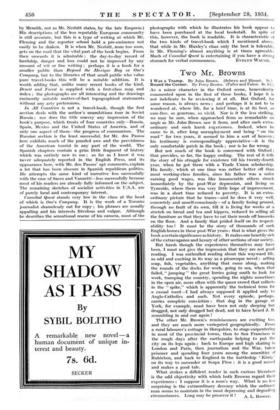Two Mr. Browns
I Was a Tramp. By John Brown. (Selwyn and Blount. 9s.) Round the Corner. By Percy Brown. (Faber and Faber. 8s. 6d.) As a minor character in the Oxford scene, benevolently commented upon in the first of these books, I hope it is not indelicate to be reviewing it at all. But Oxford, for some reason, is always news ; and perhaps it is not to be wondered at, where life, for a brief time, is at its best, so care-free, so generous, so vivid. Nor is it the less striking, we may be sure, when approached from so remarkable an angle as Mr. John Brown saw it from, and after such extra- ordinary and such harsh experiences. Indeed, when he came to it, after long unemployment and being " on the road " for two years, it seemed to him a sort of heaven ; his testimony is correspondingly appreciative—it is the only comfortable patch in the book ; nor is he far wrong.
But not much of the book is concerned with Oxford ; that provides, so far, the happy ending. The rest of it tells the story of his struggle for existence till his twenty-fourth year, when he got there with a Trade Union scholarship. His family, which at one time was rather better off than most working-class families, since his father was a sailor earning good wages, was like innumerable others struck immediately by the post-War depression, and living on Tyneside, where there was very little hope of improvement, was in a short time reduced to poverty. It is an extra- ordinary picture that he traces—and he does it very well, concretely and tmself-consciously—of a family losing ground, through no fault of its own, till, it is living for weeks at a stretch on bread and tea and kippers, reduced to selling all the furniture so that they have to eat their meals off hassocks on the floor. And a family that prided itself on its respect- ability too ! It must be the story of thousands of such English homes in these post-War years : that is what gives the book a certain significance as history. It makes one heartily sick of the extravagance and luxury of other sections of our society.
But harsh though the experiences themselves may have been, I must not give the impression that they are not good reading. I was enthralled reading about this wayward life, as odd and exciting in its way as a picaresque novel : selling soap, fish, vegetables, anything that came along, making the rounds of the' docks for work, going to sea, when that failed, " jumping " the great lorries going south to look for work, tramping the country, spending the nights sometimes in the open air, more often with the queer crowd that collects in the " spike," which is apparently the technical term for a casual ward—I had always supposed it applied only to Anglo-Catholics and such. Not every episode, perhaps, carries complete conviction : that dog in the garage at York, for example, must have been not only sleeping but drugged, not onlydrugged but dead, not to have heard J. B. scrambling in and out again !
The other Mr. Brown's reminiscences are exciting too, and they are much more variegated geographically. From a rural labourer's cottage in Shropshire, to stage-carpentering in most of the provincial towns, then to San Francisco in the rough days after the earthquake helping to put the city on its legs again ; back to Europe and high skating in London and Paris, then journalism and the War, taken prisoner and spending four years among the amenitied of Ruhleben, and back to England in the battleship Konig ' on its way to surrender at Scapa Flow : it is a good record and makes a good tale.
What strikes a diffident reader in such curious literature is the odd objectivity with which both Browns regard their experiences : I suppose it is a man's way. What is no less surprising is the extraordinary decency which the ordinary man seems to maintain in the most depressing and degrading circumstances. Long may he preserve it ! A. L. ROWSE.


















































 Previous page
Previous page